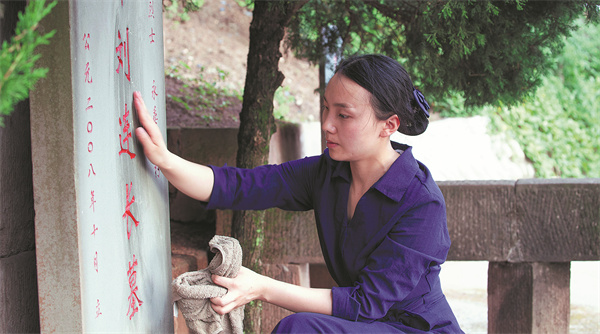Generations guard heroes' resting place
A teacher answers calls of family duty in protecting legacy of a Red Army soldier


For over nine decades, Feng Lian's family has remained in the mountains of Changpingshan in Nanbu county, Sichuan province, guarding the tomb of a Red Army company commander — a solemn commitment spanning four generations.
Feng, a 33-year-old teacher in a primary school in Nanmu township of Nanbu, is the fourth-generation keeper of the tomb.
Located about 20 meters from her home, it holds the remains of commander Liu of the Red Army led by the Communist Party of China, who died at age 25. Eleven members of Feng's family are buried alongside his resting place.
"We only know his surname was Liu and that he came from Henan province," said Feng. Although her father, Ma Quanmin, the third-generation keeper, used to ask visitors from Henan to help trace his family, the efforts were all in vain.
Feng's childhood memories vividly recall her maternal grandfather, Chen Zhongmin, gathering the family to sweep the tomb during festivals.
"Back then, meat was a rare treat we only got during the Spring Festival," she recalled. "Yet grandpa would always offer the first piece at commander Liu's tomb."
Grandfather would also tell Feng stories about commander Liu since she was little.
In 1933, commander Liu volunteered to stay behind at Changpingshan to cover the retreat of the leading forces. He often helped Feng's childless great-grandparents with housework. Her great-grandmother, surnamed Han, eventually treated him as a son.
"Local warlords made life unbearable — dozens of exorbitant taxes and levies left people without basic food and clothing," Feng said. "But the Red Army treated poor people like family."
Later, commander Liu was killed by warlord forces in battle, and his body was dumped at the foot of the mountain as a warning. The warlord troops threatened to execute entire families of anyone attempting to retrieve his remains.
On the third night, Han secretly carried commander Liu's body home with the help of her husband and relatives. She placed him in her own prepared coffin and buried him behind their house before daybreak.
The warlord forces arrested Han and tortured her for three days but failed to locate the body. She died three months after being released, leaving the last words: "The Red Army fought for the poor. Our family must guard commander Liu's tomb for generations."
Feng's great-grandfather later adopted a boy — her maternal grandfather — who never left Changpingshan his entire life. Her grandfather passed away in 2002, transferring the duty to his son-in-law.
"On his deathbed, grandpa told dad to watch over commander Liu's grave and to 'never forget this duty, in poverty or prosperity'," Feng said.
Ma was a construction labor contractor in Guangzhou, Guangdong province. After his father-in-law's death, he returned to Changpingshan to guard the tomb. Life grew much more challenging as he could only sustain the family through farming and livestock raising in the mountainous area. Yet he never wavered in keeping the family promise.
A man with few words, Ma often told her daughter "All difficulties are temporary."
In 2011, local authorities in Nanbu county built a martyr cemetery centered around commander Liu's tomb. The cemetery now entombs 1,080 martyrs who sacrificed their lives during the revolutionary wars and in public service after the founding of New China in 1949.
Ma voluntarily took on the responsibility of guarding the entire cemetery.
Like many other youths born in rural areas and small towns, Feng once yearned for life in big cities. After graduating from college, she moved to Guangzhou in 2016 with her boyfriend, Zhou Heng, for e-commerce work.
Everything seemed perfect, except for that constant tug at her heart — Changpingshan, the mountains 1,500 kilometers away that never faded from her thoughts.
"Dad struggled with Mandarin and his failing eyesight. It pained him when he couldn't properly communicate with martyrs' families coming to seek their loved ones," Feng said. No one asked her to return, yet half a year later, she found her way back to Changpingshan.
In 2017, Feng passed a public recruitment examination to become a local primary school teacher. Every weekend and holiday, she returned home to help her father clean and maintain the cemetery.
She also volunteered to become the cemetery's guide. Along the field ridge in front of her home, she planted clusters of daisies of different colors — a living tribute for visitors to honor the martyrs.
Zhou, now her husband, respected Feng's choice and returned to Sichuan. On National Day in 2020, they married before the martyr cemetery.
"My husband never made grand speeches, but his actions speak volumes," Feng said.
On occasions such as Martyrs' Day and the Qingming Festival (Tomb Sweeping Day), local schools would organize students to visit the Changpingshan martyr cemetery. Feng would tell them stories about the Red Army and commander Liu.
"These stories are living lessons, teaching children to cherish today's hard-won happiness," she said.





































